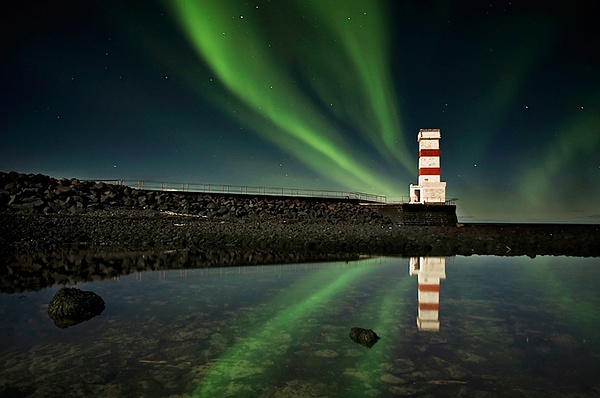没有船舶的夜晚。雾笛向积云鸣响,你
仍然活着,被光吸引,仿佛僧侣守护的一团火。
黑夜曾经与群星纠结,现在同死亡一般暗淡,你向内部驶去。
穿过野金雀花和海藻,穿过石楠和撕碎的羊毛,
你跑,拉着我的手,让我有生之年目睹一次:
光的旋转,旋转,呼啸,光在寻找失踪者。
在那里,自从有火的年岁以来,烛光与空旷的灯盏,
鲸鱼油与灯芯,油菜花与炼油,煤油与电石,
信号灯火,照亮了胡克塔边危险的海岸。
你对我说,醒着,像镜片制造者,死的时候
肺部全是玻璃,像红豆杉花,蜜蜂成群飞去时仍然盛开,
像琥珀色的大教堂,甚至连西多教的鬼也会善待你。
如同在雨后的珠光碧云里,或更远的水中,
水,看到或感觉到的,海水或湖水,你静止下来,长时间
向外凝视。当萤火虫睁眼,闭合,在松树间发光,
一颗星辰升起,我们唯一的天堂。你教我这样活着。
死后如同初生之前。没有什么
可畏惧。只有幸福难以承受,如同它的源泉
一样可怕。向着光,永远向着光,无需船舶。
作者/ [美国] 卡罗琳·佛雪
翻译/ 明迪
A night without ships. Foghorns called into walled cloud, and you
still alive, drawn to the light as if it were a fire kept by monks,
darkness once crusted with stars, but now death-dark as you sail inward.
Through wild gorse and sea wrack, through heather and torn wool
you ran, pulling me by the hand, so I might see this for once in my life:
the spin and spin of light, the whirring of it, light in search of the lost,
there since the era of fire, era of candles and hollow-wick lamps,
whale oil and solid wick, colza and lard, kerosene and carbide,
the signal fires lighted on this perilous coast in the Tower of Hook.
You say to me stay awake, be like the lensmaker who died with his
lungs full of glass, be the yew in blossom when bees swarm, be
their amber cathedral and even the ghosts of Cistercians will be kind to you.
In a certain light as after rain, in pearled clouds or the water beyond,
seen or sensed water, sea or lake, you would stop still and gaze out
for a long time. Also when fireflies opened and closed in the pines,
and a star appeared, our only heaven. You taught me to live like this.
That after death it would be as it was before we were born. Nothing
to be afraid. Nothing but happiness as unbearable as the dread
from which it comes. Go toward the light always, be without ships.
CAROLYN FORCHÉ
灯塔,是一个古老得有些乏味的象征。对于住在城市里的人,可能无法体会灯塔对于黑暗中航行的船员的重要性;而今日的船员更仰仗于卫星导航和各类地理信息系统来指明方向,陆地上的灯塔与天空中的星辰,不再那样直接地决定着航海者的命运。
卡罗琳·佛雪(Carolyn Forché)的《灯塔》作于2007年,发表于2010年的《纽约客》杂志。诗中那位拉着她的手的「你」曾带她去看过一座灯塔,但已因癌症辞世。卡罗琳写作此诗时也在接受癌症治疗,那一夜与友人靠近灯塔的场景成为了她的见证。这位出生于天主教家庭的诗人在几乎被废弃的灯塔技术中,明确了人的位置:始终是需要某种光,来定义人的方向。
在一开始,一个人发现没有船只可渡;然后一座,旋转着投出光束的塔让她经验到持续的寻找;当她见到一颗特别的星辰如天堂升起,便发出了对于活着的定义;在最后,她发现船只也不再必要。
至于野金雀花、海藻、石楠和撕碎的羊毛,也许是生活的种种体验;而动物油、植物油、矿物油的种种灯火,组成了人们寻找光与被光寻找的一句话微型技术史;还有将自身提纯为玻璃的磨镜人,和为蜂群盛放的红豆杉花,是作者对于病痛和失去的解答,这解答也成为了一个安慰。
当一个诗人被信仰所照见,她笔下的象征便不再疲乏。
荐诗 / 范致行
2013/08/11

近期评论